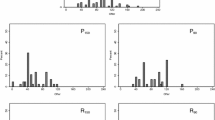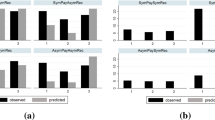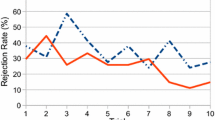Abstract
This article presents the experimental results of a “Transcontinental Ultimatum Game” implemented between India and France. We use a standard ultimatum game, but in one treatment, Indian subjects made offers to French subjects (ItoF treatment) and, in another treatment, French subjects made offers to Indian subjects (FtoI treatment). We observed that FtoI treatment bargaining mostly ended up with unequal splits of money in favor of French, while nearly equal splits were the most frequent outcome in ItoF treatment interactions. The experimental results are organized through a standard social reference model, modified for taking into account the different marginal value of money for bargainers. In our model, bargaining is driven by relative standing comparisons between players, occurring in terms of real earnings (that is monetary earnings corrected for a purchasing power factor) obtained in the game. The norm of equity behind the equalization of real earnings is called local equity norm, and contrasted to a global equity norm which would encompass the wealth of players beyond the game. According to what we observed, no beyond-game concern seems to be relevantly endorsed by subjects.
Similar content being viewed by others
References
Andreoni J., Miller J. (2002) Giving according to GARP: An experimental test of the consistency of preferences for altruism. Econometrica 70(2): 737–753
Bolton G.E. (1991) A comparative model of bargaining: Theory and evidence. The American Economic Review 81(5): 1097–1136
Bolton G.E., Ockenfels A. (2000) ERC: A theory of equity, reciprocity, and competition. The American Economic Review 90(1): 166–193
Buchan, N. R., Croson, R. T. A., & Johnson, E. J. (1997). Trust and reciprocity: An international experiment, Working Paper.
Camerer, C. F. (2003). Behavioral game theory: Experiments in strategic interaction. Princeton: Princeton University Press, New York: Russell Sage Foundation.
Charness G., Rabin M. (2002) Understanding social preferences with simple tests. Quarterly Journal of Economics 117(3): 817–869
Dufwenberg M., Kirchsteiger G. (2004) A theory of sequential reciprocity. Games and Economic Behavior 47(2): 268–298
Elster J. (1991). Local justice and interpersonal comparisons. In: Elster J., Roemer J.E. (eds). Interpersonal comparisons of well-being. Cambridge, Cambridge University Press, pp. 98–126.
Elster, J. (1992). Local justice: How institutions allocate scarce goods and necessary burdens. Russel Sage Foundation.
Fehr E., Schmidt K. (1999) A theory of fairness, competition, and cooperation. Quarterly Journal of Economics 114: 769–816
Gintis H. (2000) Game theory evolving. Princeton University Press, Princeton
Güth W. (1995) On ultimatum bargaining experiments: A personal review. Journal of Economic Behavior and Organization 27: 329–344
Güth W.R., Schmittberger R., Schwarz B. (1982) An experimental analysis of ultimatum bargaining. Journal of Economic Behavior, & Organization 3: 367–388
Henrich J., Boyd R., Bowles S., Camerer C., Fehr E. et al (2001) In search of homo economicus: Behavioral experiments in 15 small-scale societies. American Economic Review 91(2): 73–78
Kagel J.H., Kim C., Moser D. (1996) Fairness in ultimatum games with asymmetric information and asymmetric payoffs. Games and Economic Behavior 13(1): 100–110
Kirchsteiger G. (1994) The role of envy in ultimatum games. Journal of Economic Behavior, & Organization 25(3): 373–389
Oosterbeek H., Sloof R., van de Kuilen G. (2004) Cultural differences in ultimatum game experiments: Evidence from a meta-analysis. Experimental Economics 7(2): 171–188
Rabin M. (1993) Incorporating fairness into game theory and economics. American Economic Review 83: 1281–1302
Roth A.E. (1995). Bargaining experiments. In: Kagel J.H., Roth A.E. (eds.) Handbook of experimental economics. Princeton, Princeton University Press, pp 253–341
Roth A.E., Prasnikar V., Okuno Fujiwara M., Zamir S. (1991) Bargaining and market behavior in Jerusalem, Ljubjana, Pittsburg, and Tokyo: An experimental study. American Economic Review 81(5): 1068–1095
Sen A. (1992) Inequality reexamined. Clarendon Press, Oxford
Author information
Authors and Affiliations
Corresponding author
Rights and permissions
About this article
Cite this article
Boarini, R., Laslier, JF. & Robin, S. Interpersonal comparisons of utility in bargaining: evidence from a transcontinental ultimatum game. Theory Decis 67, 341–373 (2009). https://doi.org/10.1007/s11238-009-9135-5
Received:
Accepted:
Published:
Issue Date:
DOI: https://doi.org/10.1007/s11238-009-9135-5




